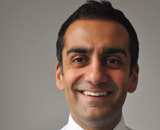 One of the most common questions I have had since becoming the clinical editor of TEDMED is what’s the “next big thing.” When I started the role I actually tried to answer but as time has gone on I have resisted—and felt more and more disappointed with the people asking the question.
One of the most common questions I have had since becoming the clinical editor of TEDMED is what’s the “next big thing.” When I started the role I actually tried to answer but as time has gone on I have resisted—and felt more and more disappointed with the people asking the question.
My disappointment has two dimensions. Firstly, having worked for an entrepreneur for almost a decade, I have learnt that even if there is the promise of the “next big thing” the only way it becomes a reality is through perseverance and adaptability. When I joined BioMed Central in 1999, we really had no idea that we were on the road to proving that open access publishing could become a commercially sustainable reality. These days there is much hype about the promise of open access and yet back then all our fearless leader believed was that with the advent of the internet there had to be a better approach to scientific publishing.
The second dimension to my disappointment is what I describe as laziness. Around the much-hyped world of innovation there is what can only be described as a paranoid frenzy. Most entrepreneurs are petrified that they’re not “hot” enough, while investors look for all sorts of reassurance that their money may return multiplied and plentiful—and soon.
I’ll freely admit that my second dimension probably fails to appreciate the risks of innovation. Entrepreneurs and investors have a lot at stake. But the truth is that the people that ask about the “next big thing” are rarely the entrepreneurs and investors. They’re the observers, the commentators; the all-knowing crowd always ready to unleash the wisdom of hindsight. No entrepreneur or investor has ever asked me about the “next big thing.”
If there is ever going to be a “next big thing” experience tells us there will be bumps along the way. I’ll never forget the day at BioMed Central when the then editorial director for medicine, none other than the BMJ’s current editor-in-chief, Fiona Godlee, told me of the intention to charge authors to have their articles published. At the time the “author-pays” model was associated with vanity publishing. Even though the economics (and social justice angle) of the author-pays model was robust I remember feeling like it was the beginning of the end; our credibility would never survive. And yet, less than a decade later, the model is considered the future of scientific publishing.
I recalled this “bump” today when I was reading an awesome article about “data Darwinism.” It made me think of all the frenzied enthusiasm of “big data;” vocal observers and commentators are ready to imagine a world of possibilities without even beginning to see the possible bumps in the road.
There’s no formal definition of data Darwinism but it’s the idea that the greater use of data will lead to new types of demand for products and services. The article refers to a taxi driver revolt in San Francisco where an app is being used to book taxis and rate drivers. Poorly rated drivers are being kicked off the service, which impacts on their income. The drivers are up in arms because their world has been turned upside down by an app that none of them asked for.
Is a parallel likely in the future world of big data? I think very much so.
I have health insurance through PruHealth and part of what they offer is a wellness programme called Vitality. In essence, I tell it what healthy stuff I have done and it rewards me with points. As ever, points mean prizes, usually money off my premiums. By proving that I am living healthily, my insurance gets cheaper.
But what if my points also indicated what healthcare I was “allowed” to have? Surely it stands to reason that people with a lot of points have taken care of themselves and so, should they become ill, they “deserve” more care? Of course, I don’t actually believe that but it’s a dystopian possibility in a world blindly collecting wellness data and telling itself it means something.
There is no “next big thing.” In their heart of hearts, all entrepreneurs and investors know this. It’s easy to paint a utopian view of the future (even I’m getting in on it) but what really matters are the bumps, and how we respond to them. The big data bump is just around the corner (especially given recent news on interoperability and clever initiatives like Smart Platforms). In the future, data won’t be king, how we analyse it will be. It’ll be the algorithm that matters.
The need for intelligent algorithms is the bump-to-be. Sadly, I think some will see it as the “next big thing.”
Competing interests: I do not have any competing interests in relation to this post, although I have endorsed one of the leaders of Smart Platforms for TEDMED2013.
Pritpal S Tamber is the director of Optimising Clinical Knowledge, a consultancy that helps organisations in and around healthcare design clinically credible strategies that have a measurable impact on care (@pstamber).